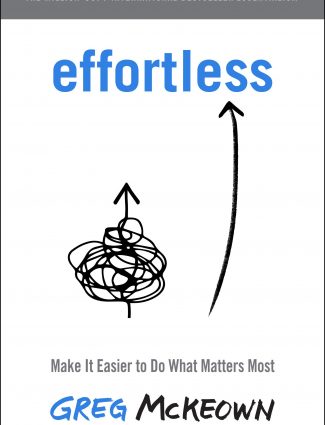Effortless by Greg McKeown

Georg McKeown is the author of Essentialism, a book whose purpose was to help the readers to discern the essential from not important. However, as the author admits, focusing on the essential is sometimes not enough, because it turns out that these few essential things that we want to devote ourselves to, also require more power than we have available. This brings the author to the question, what are the ways we can still do the essential but with less effort. How can this all be effortless?
All too often, we make things more complicated than they are or need to be. Author points out that more often he had problems by trying too hard than other way round. For example, he tells a story about how he was preparing for a speech he need to give the next day. He wanted it to be perfect, so he found new ideas and worked late in the night to prepare a new and interesting speech. But day after he was exhausted, and he hadn’t had enough time to practice so he seemed unprepared.
Effortless State, Action and Results
The first part of the book is devoted to the effortless state. One could also entitle this part as effortless mindset. Placing this part of the book in the beginning shows the importance of starting with attitude. Sometimes our mindset might change a tedious or even difficult task into an effortless one. The advice is to ask the following question. What if this could be easy? Sometimes, to make things effortless, all we need to do is to intertwine some fun. This makes the burden of a chore go away.
Effortless action is focused on things we can do to make things done. Sometimes the task ahead of us seems so difficult that we are postponing it. An easy way out of this misery could be to define how the ‘done’ looks like. If we list necessary things that need to be done, we create an action plan and, by crossing the items from the list, we receive additional shots of dopamine as a reward for task completion and will be more motivated to finish the task.
Sometimes our inner critic is preventing us from doing the work. But if we agree to start with rubbish, then we can salient the critical inner voice and start producing work. The advice is to start ugly or imperfect. Our work can usually be corrected in the later stages.
Slow is smooth, smooth is fast
This means it is better to be consistent and do even a small bit of work every day as opposed to pushing on only some days. The first approach will take us farther. It is even good to set an upper limit and to stop working after hitting the upper threshold.
Effortless results are related to actions that create constant results as opposed to linear results. Residual results are when we exert effort once and reap benefits multiple times. Learn general principles that can be used multiple times in different fields.
